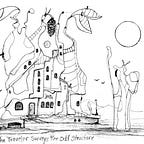How Strong Towns Principles Relate to Sioux Falls — Growth or Stability (In a Fragile World)
based on “Strong Towns — A Bottom-Up Revolution To Rebuild American Prosperity” by Charles L. Marohn, Jr.
“The tragic reversal comes from the realization that growth once served us, but now we serve growth. The constraint of modern America is that we must experience annual growth in our economy. Without growth, we can’t service our debts, pay our retirements and pensions, and keep up with the rising costs of health care and education.” — Chuck Marohn
The current pandemic is causing incredible suffering worldwide. In this country and other parts of the world, this tragedy is compounded by the implosion of the financial system. Stock prices have plummeted and businesses are being forced to close. Here in Sioux Falls people are out of work because of business closures and daily activities have been sharply curtailed by social distancing. Our sympathy goes out to everyone affected by the situation we find ourselves in. But, now we need to learn from this to make ourselves and our town stronger in the future.
In previous articles in this series, Revenues and Expenses and Municipal Ponzi Scheme we talked about how sales tax revenue was creating an illusion of wealth in Sioux Falls. The city has been taking on liabilities in the form of new infrastructure developments at a rate of about 400 acres annexed into the city per year for many years. These developments generally don’t create enough of a property tax base to pay for their long-term maintenance and eventual replacement — we rely on sales tax to do that. The 2019 city budget showed sales tax and entertainment tax revenue accounted for more than twice the property tax revenue. The city had a sales tax surplus which gave the illusion of wealth. As it turns out, this is a good time to have a surplus. We asked the question “What could go wrong?”. Now we know.
Sales tax is going to take a big hit. Bars and restaurants accounted for significant revenue for the city because of the entertainment tax. Now they are closed and that part of the revenue stream will dry up. Sioux Falls is a regional shopping center so much of the sales tax came from visitors. Stay at home directives and closed malls will cut into that revenue as well. Plus, the people who are out of work because of closures aren’t going to be spending a lot of money and that tax stream will shrink as well. We don’t know how long these closures will last or when sales tax revenue is likely to recover. What we do know is that if the city needs growth to stay ahead of its liabilities it is not going to get it this year.
So, the point is not that sales tax is bad but relying on it to cover liabilities taken on as new growth year after year is bad. New developments should have the capacity to produce enough property tax to cover the cost of their existence. Property tax is a more stable source of revenue than sales tax — property doesn’t go anywhere. Sales tax producing entities can pack up and leave town or succumb to a financial crisis. Communities built on the constant growth model are fragile especially if many of the entities producing the growth are national or global corporations. A profitable local branch of a national corporation may be forced to close if the parent corporation tanks because of problems elsewhere in its operations. The local economy takes a hit through no fault of its own.
A lesson to be learned from this, according to Marohn, is that local entrepreneurs create more stable local economies than international investors and are more likely to spur recovery when restrictions are lifted. For example, if a local restaurant is forced to close, the entrepreneur who started it will probably be around when the recovery starts and is the most likely candidate to start it up again. The property owner will be anxious to get revenue and may temporarily reduce rent to get the restaurant going. When the restaurant is operational again, the property owner can afford to pay property tax and the restaurant will begin to generate sales tax.
The story may be different when a chain restaurant closes. If the chain has financial problems in all its locations, it may simply go bankrupt. The property may sit empty for a long time not generating any sales tax as the chain liquidates its assets.
What we can learn from all this to make our town stronger is that 1) taking on unproductive new developments year after year is a bad idea — especially if we rely on sales tax to make up for the property tax shortfall and 2) promoting incremental development with entrepreneurs is more stable than relying on international investors and expansive development projects.
